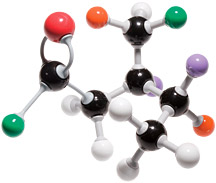Coenzyme Q10: Unlike magnesium and vitamin D, coenzyme Q10 (CoQ10) acts directly as an antioxidant.
It also enhances cellular energy production and positively influences healthy gene expression in skeletal muscle, making it the ideal antioxidant supplement. CoQ
10 has become somewhat famous recently because its synthesis in the body is known to be reduced by
cholesterol-lowering statin drugs, and the many side effects of statins, such as fatigue and muscle pain, are thought to be related to reduced CoQ
10 production.
Coenzyme Q10 is perhaps the most important antioxidant supplement because it regenerates vitamins C and E that we get from food and supplements. At least 100 mg per day is recommended to double blood levels, and we know that we cannot get this amount in food, making CoQ10 a key antioxidant supplement.
Botanicals: As mentioned, most botanicals (herbs and spices) have anti-inflammatory and antioxidant functions. Three of the most commonly supplemented herbs are ginger, turmeric and garlic. Typical recommended amounts are 1 gram each of ginger and turmeric and 5 milligrams of allicin, which is the active component of garlic.
In summary, if you desire to fight free radicals, a powerful combination includes the anti-inflammatory diet and supplementation with a multivitamin, vitamin D, magnesium, coenzyme Q10, ginger, turmeric, and garlic. Talk to your doctor before making any major changes to your diet or beginning a supplement regimen, particularly if you are taking blood-thinning agents such as Coumadin or are on multiple medications.
Free Radicals: How They Cause Damage and What You Can Do About It
 Free radicals are produced during normal metabolic reactions such as energy production and immune defense. In general, they are highly reactive, meaning they are likely to interact with other molecules/cells. Poor health behaviors such as improper diet, smoking, exposure to environmental pollutants, chemicals, etc., increase production of free radicals and uncouple the body's natural antioxidant system, leading to cellular and tissue damage. Over time, this cellular damage may accelerate the aging process and lead to numerous diseases. Antioxidants help neutralize free radicals, making them unlikely to interact with healthy molecules/cells and do damage.
Free radicals are produced during normal metabolic reactions such as energy production and immune defense. In general, they are highly reactive, meaning they are likely to interact with other molecules/cells. Poor health behaviors such as improper diet, smoking, exposure to environmental pollutants, chemicals, etc., increase production of free radicals and uncouple the body's natural antioxidant system, leading to cellular and tissue damage. Over time, this cellular damage may accelerate the aging process and lead to numerous diseases. Antioxidants help neutralize free radicals, making them unlikely to interact with healthy molecules/cells and do damage.
David Seaman, MS, DC, DACBN, is the author of Clinical Nutrition for Pain, Inflammation and Tissue Healing. He has a master's degree in nutrition from the University of Bridgeport, Conn., and lectures on nutrition.

